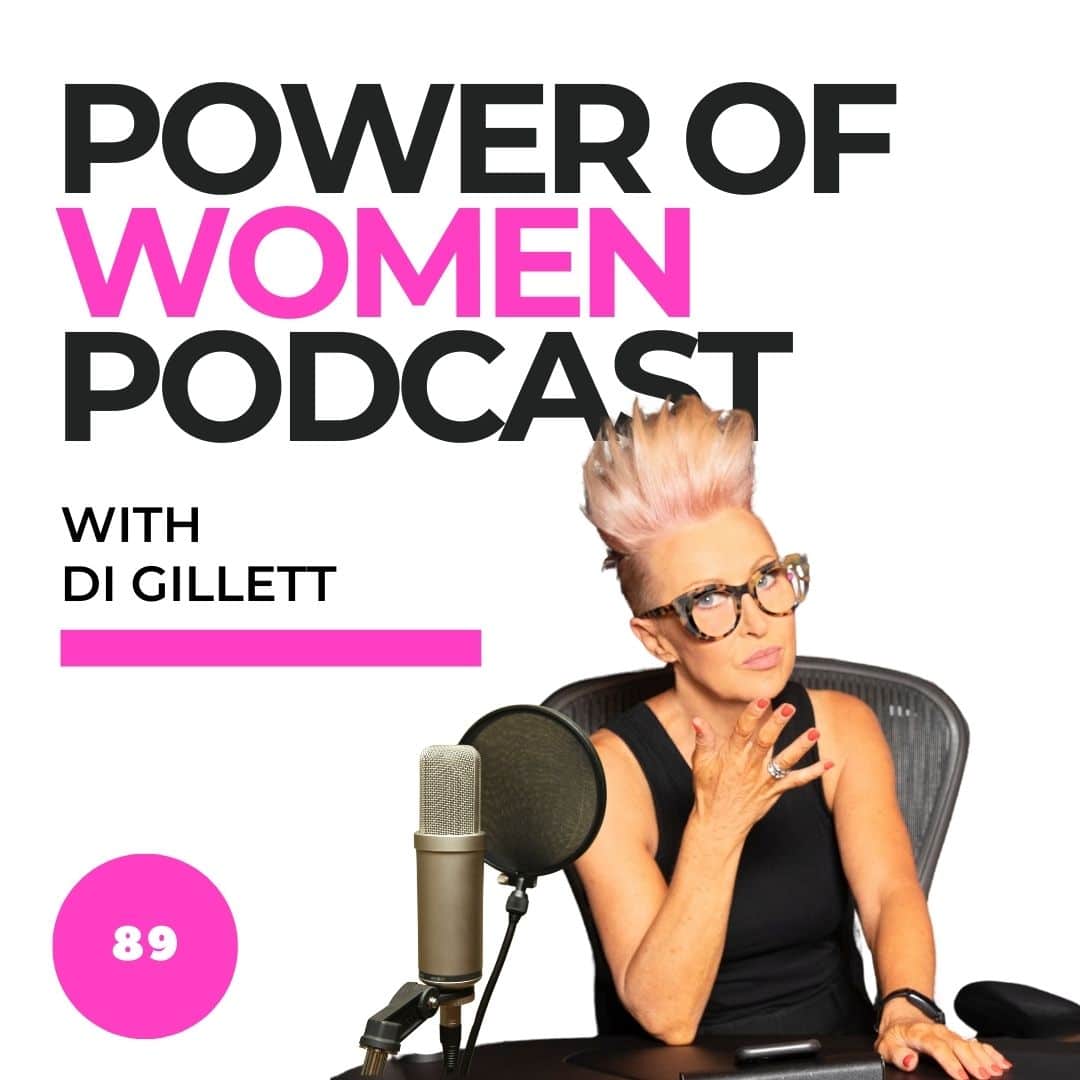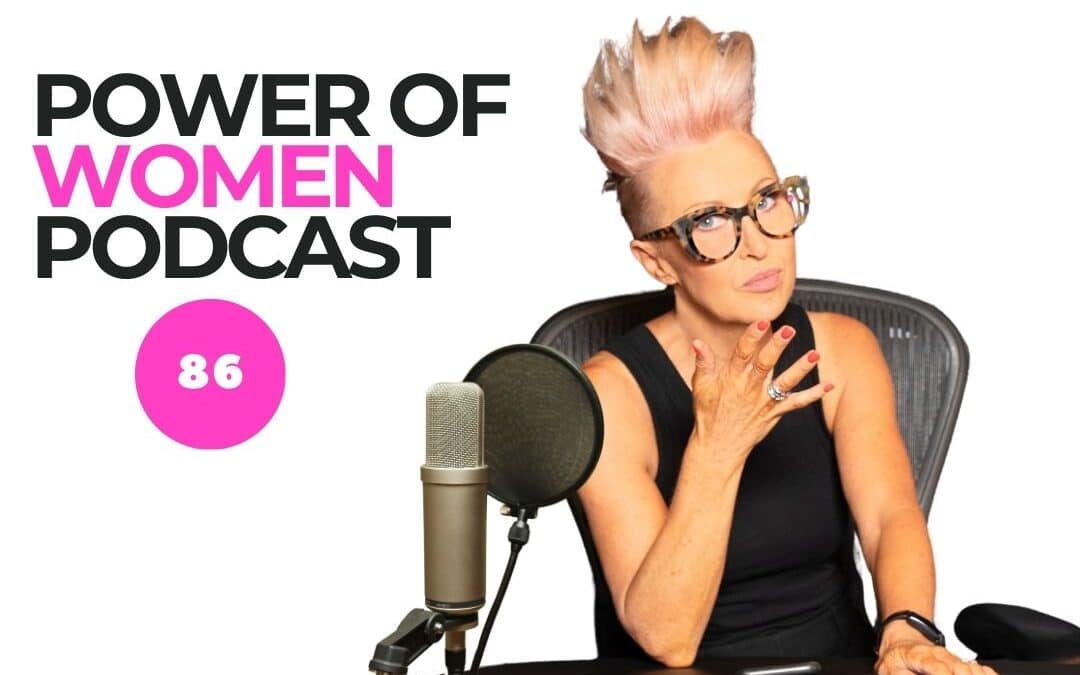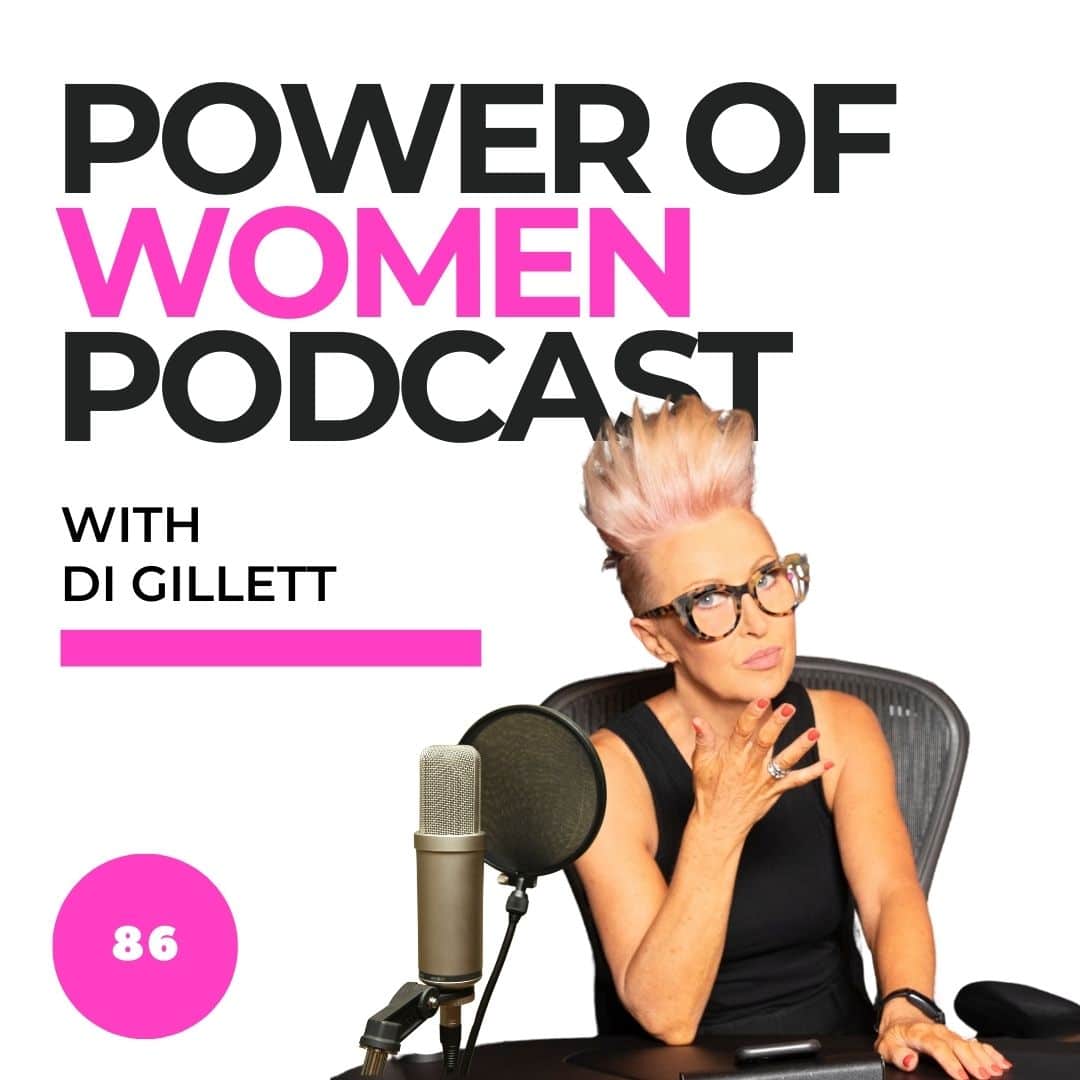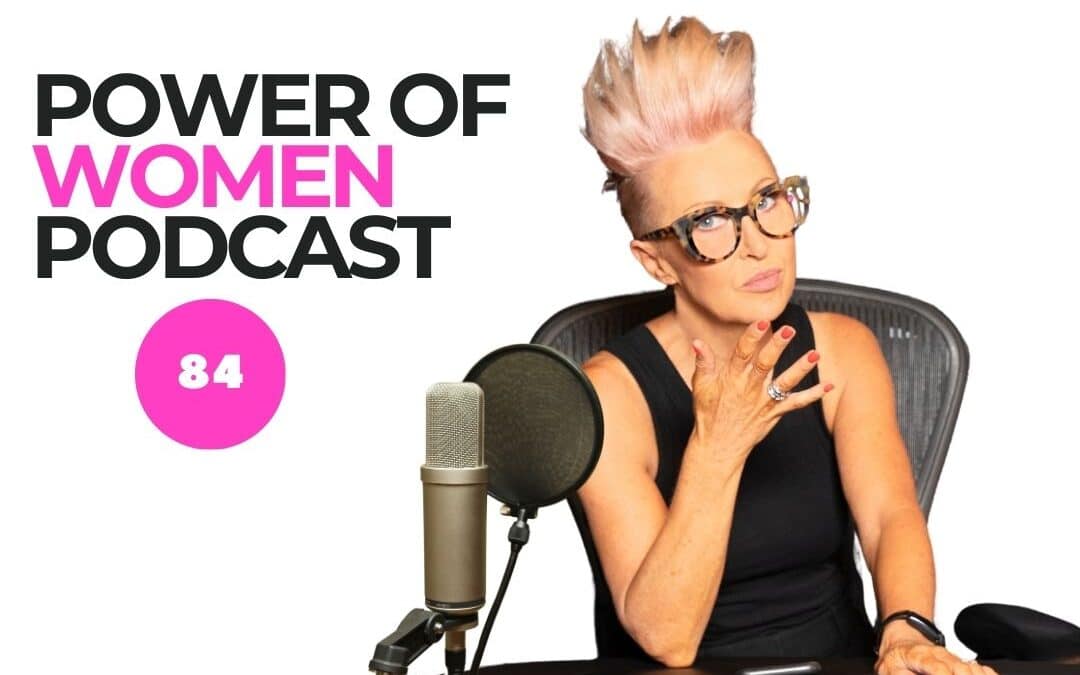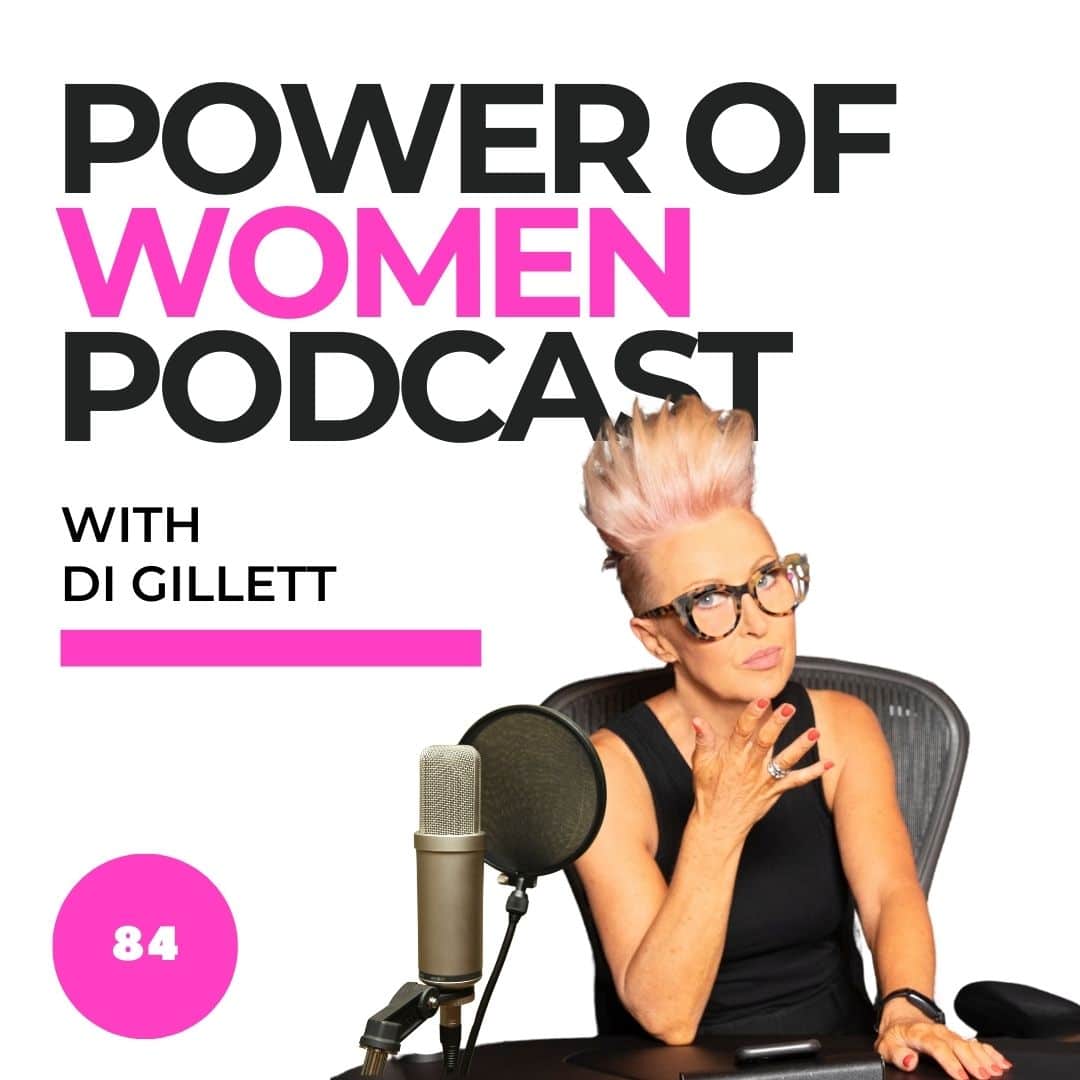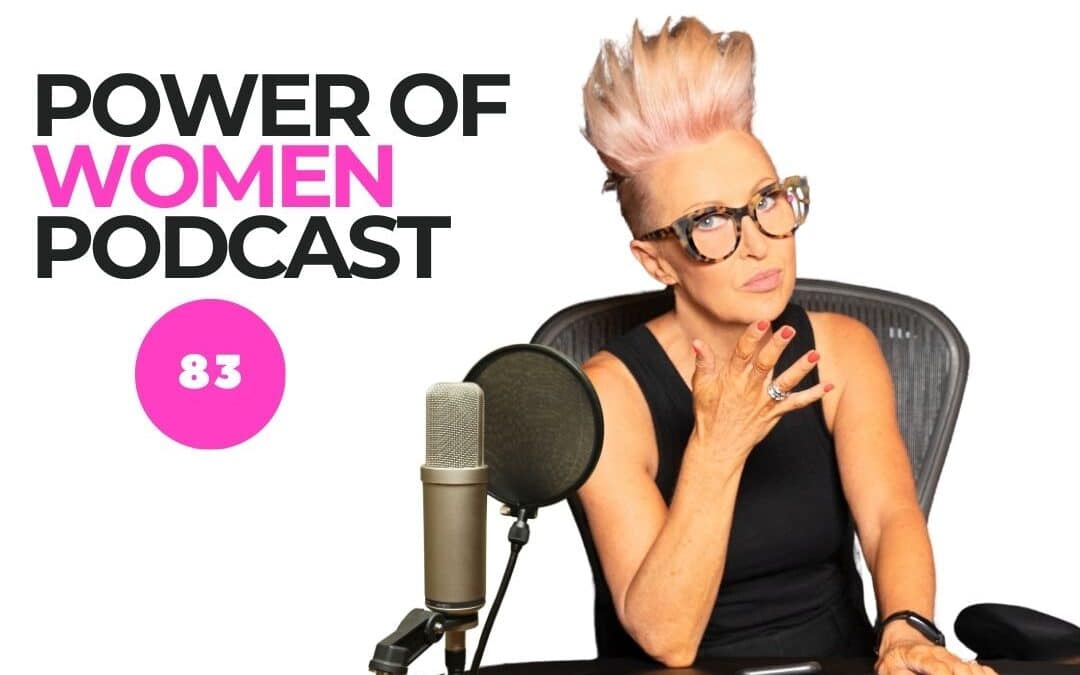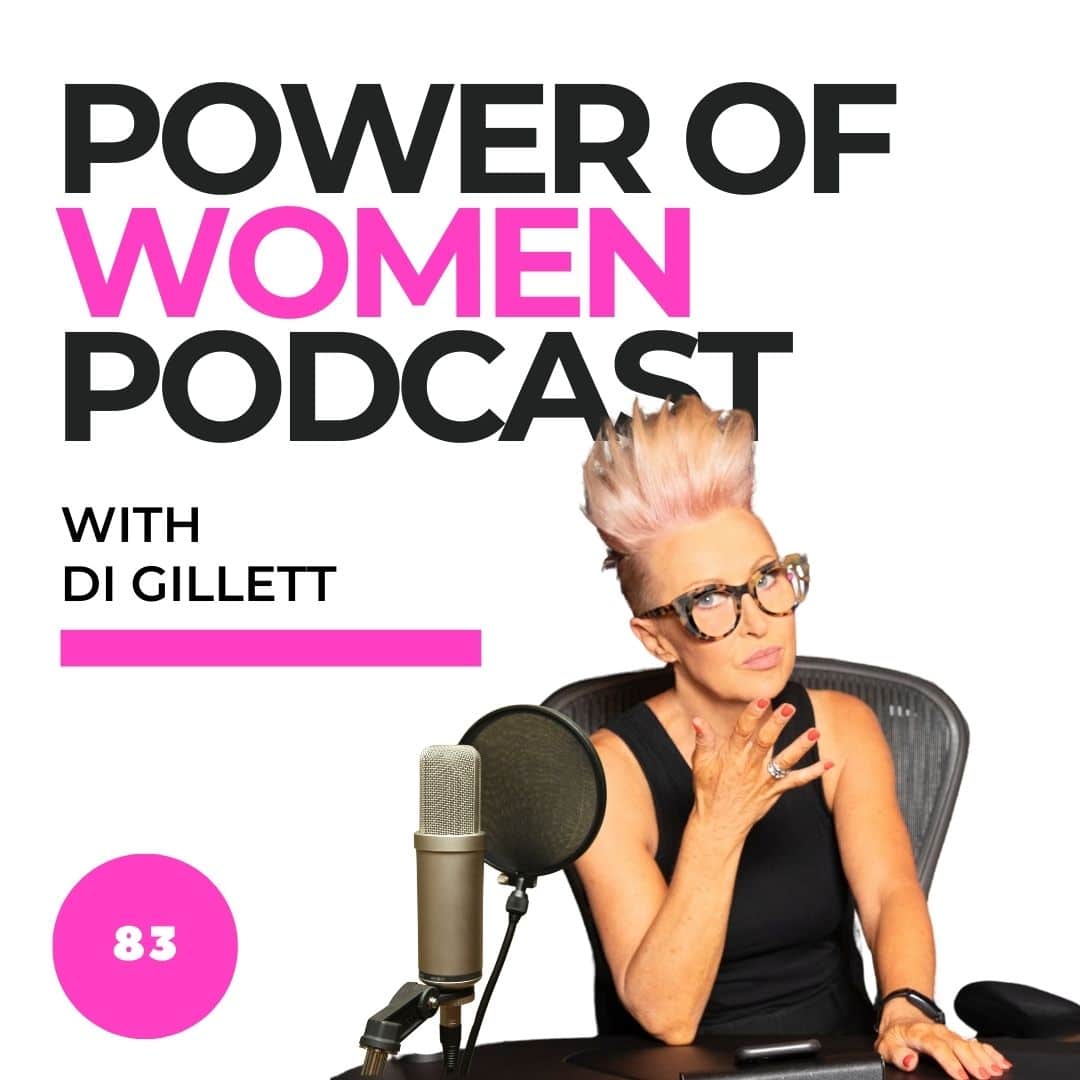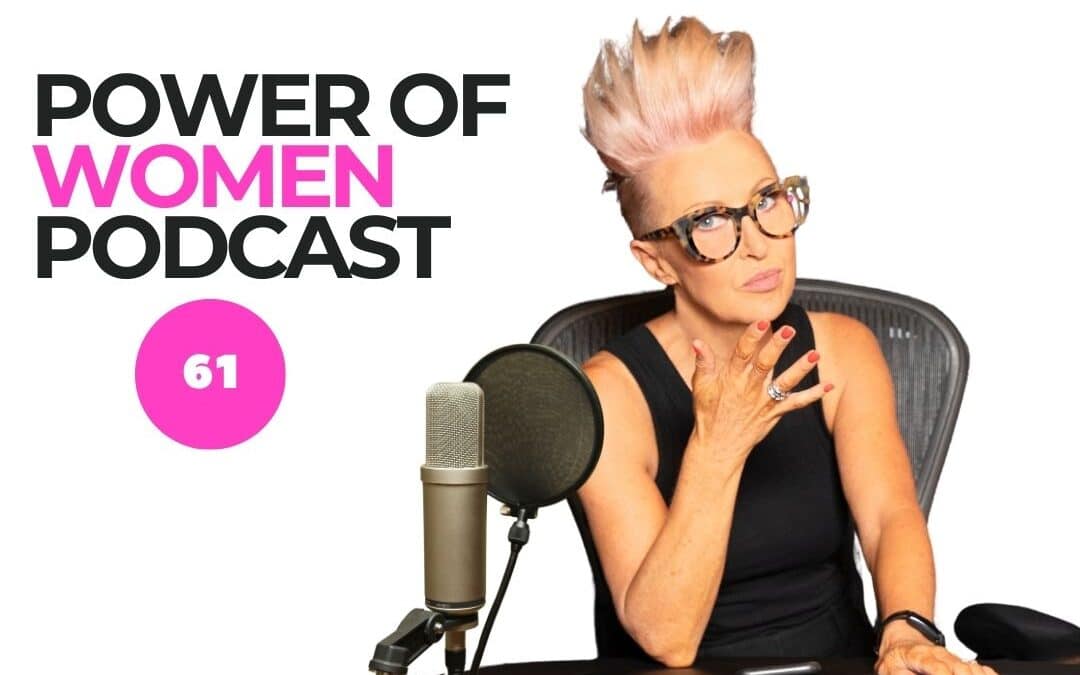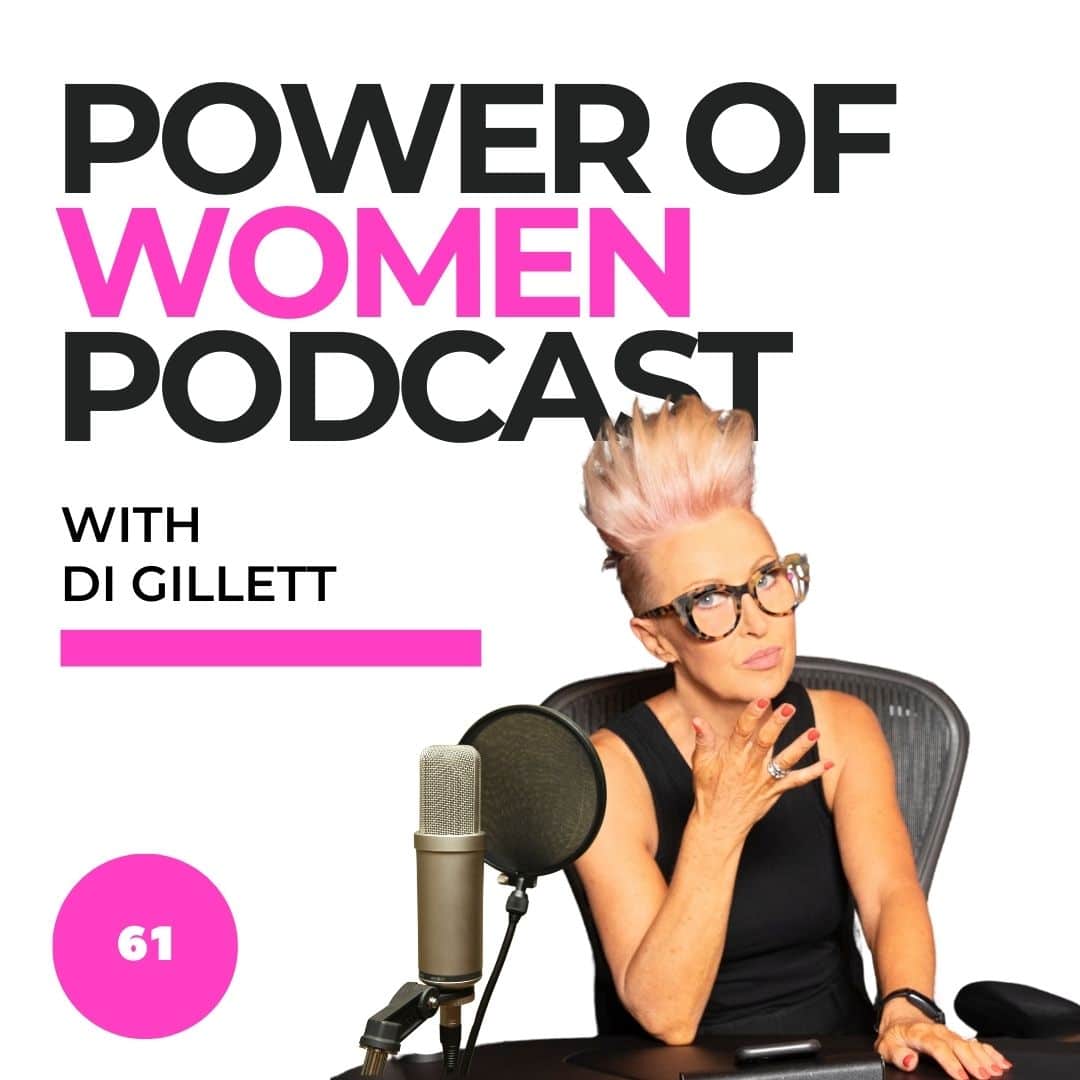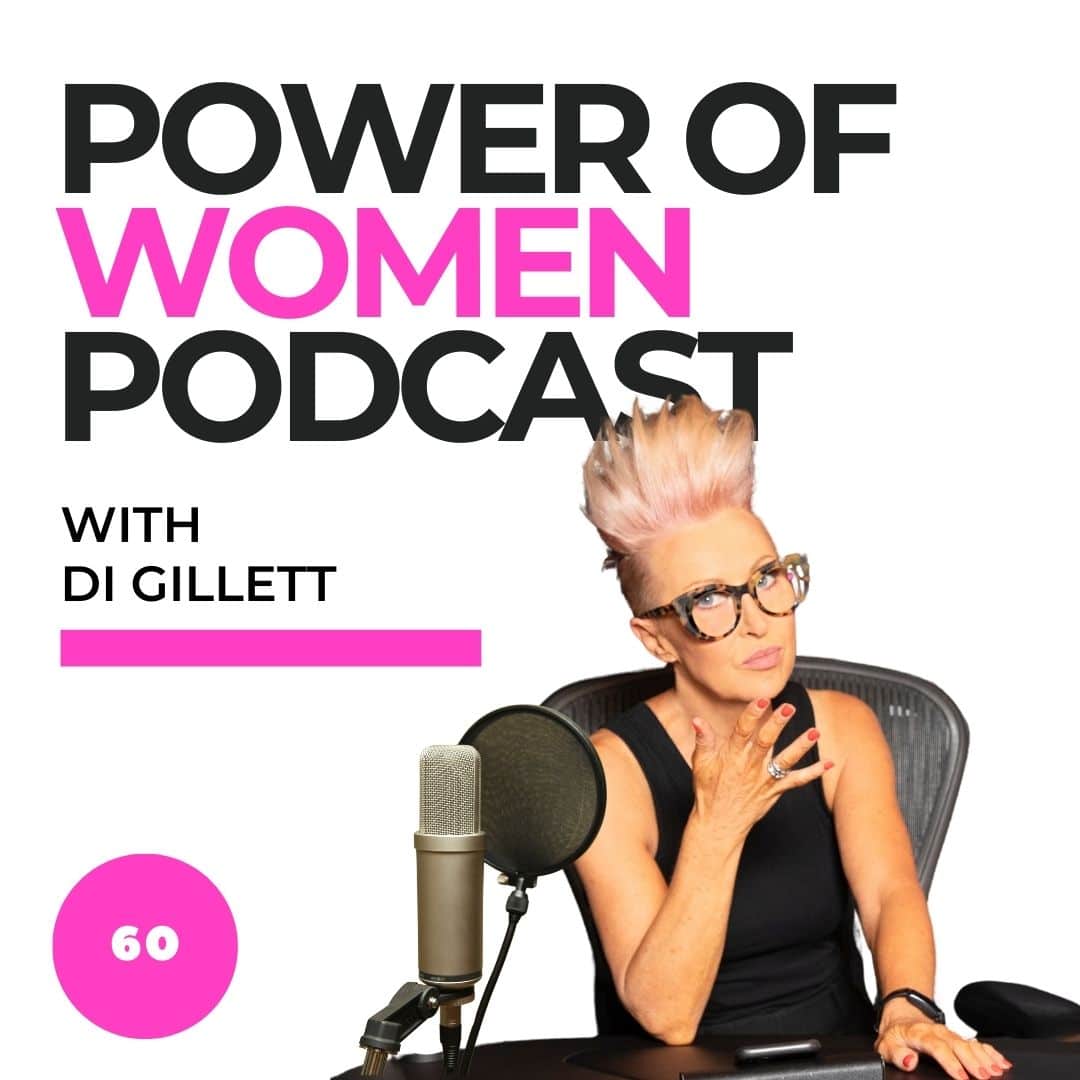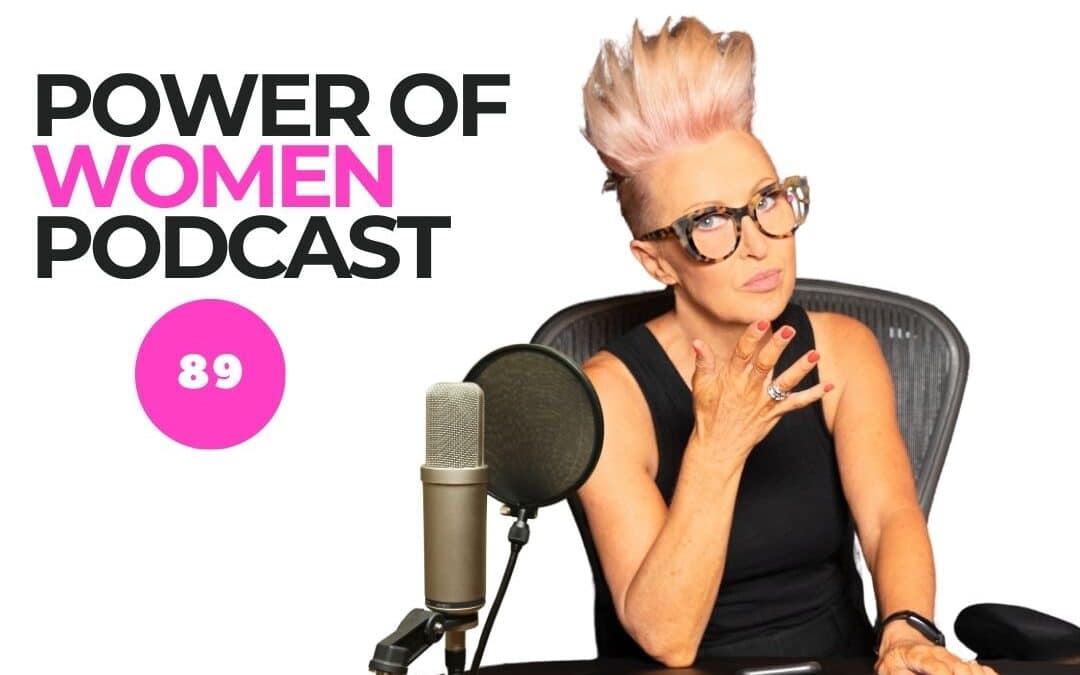
The Transformative Power of Wellness, Leadership & Permission to Pause
In this episode of the Power Of Women Podcast, host Di Gillett speaks with Lyndall Mitchell, the trailblazer who has shaped Australia’s wellness landscape for nearly three decades. From a 14-year-old doing work experience at Camp Eden to founding Aurora Spa and the award-winning ASPAR product line, Lyndall has dedicated her career to helping others refuel and reset.
She shares why wellness is not indulgence but a necessity, the warning signs of burnout, and the simple rituals that sustain leaders, parents, and entrepreneurs alike. This is a conversation about resilience, reinvention, and the power of small, consistent actions.
You’ll Hear:
➜ How a teenage work experience led to a life-long calling in wellness
➜ The vision behind Aurora Spa and why urban retreats were groundbreaking in Australia
➜ The four foundations of wellness: sleep, movement, nutrition, and digital detox
➜ Why women struggle to give themselves “permission to pause” without guilt
➜ Practical rituals to build resilience and prevent burnout
➜ Why Lyndall believes wellness should be part of healthcare, not just self-care.
Lyndall said:
It’s the small things you do every day that make the greatest difference.”
“Wellness is not something we master. It’s a practice we continually evolve.”
“Permission to pause isn’t a luxury, it’s the fuel for leadership, longevity and life.”
💥 New episodes drop every Monday to power your week.
Your T📖 Read the full transcript of this conversation here:
FULL TRANSCRIPT:
LYNDALL MITCHELL – AURORA SPA (00:02)
You’re not alone. A lot of people are doing this and our sleep is what is the dishwasher for our brain. This is where we get our energy, this is where we refuel our tank but we refuel our brain. But we also refuel our self-regulation to be able to make great decisions. And so in the morning if you’ve had a terrible sleep and interrupted sleep, chances are you’re not going to eat well. You probably won’t move your body and you’ll probably spend more money. Now there’s evidence around that.
DI GILLETT – HOST (00:29)
You’re crazy.
LYNDALL MITCHELL – AURORA SPA (00:30)
So how do we be the protector of our sleep? Because there’s plenty of sleep robbers out there and our phones can be one of those. I’m Lyndall Mitchell and my values are health, family and economic security which ⁓ really gives me that freedom of choice later in life and my big belief is that it’s the small things in life that you do consistently that make the greatest change.
DI GILLETT – HOST (00:56)
I’m Di Gillett and welcome to the Power of Women podcast. We’re a platform that celebrates and showcases the strength, resilience and achievement of women from all walks of life. And this is an invitation to join the Power of Women community and follow us on every game changing, unfiltered conversation with these amazing women.
Today, I have the privilege to showcase the story of a woman who is the pioneer of the wellness sector in Australia. And she has lived and breathed it for more than three decades. Lyndall Mitchell is the founder of Aurora Spa, Australia’s first award-winning urban spa group. She’s also a coach, a speaker, author, and entrepreneur who has built a wellness ecosystem
designed to give her clients something many of us struggle to find, permission to pause. Her story is one of vision and an unwavering devotion to her clients, a devotion that sees her employ and empower nearly 50 women in the organization. And she guides executives through transformational change and inspires companies and individuals across Australia and globally.
So today in our conversation, we’re going to explore what it means to refuel your emotional and physical petrol tank. Why ignoring the signs of burnout comes at such a cost and how wellness is a necessity for leadership, life and longevity. Lyndall Mitchell, welcome to the Power of Women podcast.
LYNDALL MITCHELL – AURORA SPA (02:41)
Thank you, Di. It’s so wonderful to be here with your community.
DI GILLETT – HOST (02:45)
Thank
you. Lindle, you’ve been immersed in the wellness space for, as I said, almost three decades, or it might even be tipping over three decades, but since you were actually 14. Correct. So can you take us back to that experience of Camp Eden when you work experience from the neighbouring property and what you saw that really resonated and drew you into this industry?
LYNDALL MITCHELL – AURORA SPA (03:15)
I grew up next door to Australia’s first health retreat and at the age of 14 had the opportunity to do work experience there. And I already knew the staff because mum and I had a little banana stall down on the side of the road where you put money in the jar for the banana. And so we got to know the staff that worked at Australia’s first health retreat being Camp Eden. And so when I was 14, I did go there and do work experience.
And it really opened my eyes to these passionate, incredibly healthy humans that loved what they did. And you know, I saw my dad as a farmer, working every day, working hard. And whilst I think he enjoyed what he did, to see people that were this radiant health and passion with the joy they were getting out of working with guests, that’s what really inspired me. So that planted the seed when I was 14.
DI GILLETT – HOST (04:06)
Yeah.
LYNDALL MITCHELL – AURORA SPA (04:12)
Went back to living on the farm, had my own pet kangaroo.
DI GILLETT – HOST (04:15)
Ah, so did I. We could share a story. did. Wow. And a pet emu.
LYNDALL MITCHELL – AURORA SPA (04:20)
Okay, I need to know about that. Yeah, incredible, you know, ⁓ opportunity growing up. was such a beautiful 140 acres of tropical rain. The hint of like, you know, bananas, avocados, pawpaws were there as well. know, mum and dad lived the wellness lifestyle. And so that seed that was planted, I then wanted to explore that straight after I finished school.
DI GILLETT – HOST (04:32)
Beautiful
LYNDALL MITCHELL – AURORA SPA (04:46)
So I went back when I was 18 and I spent the next five years working at Eden and really working my way up. Started in the lowest paying office position and I just said yes to every opportunity that came my way. Before you know it, I’m program coordinator, which means you have 50 guests coming in and you’re the host of that program. It’s a big deal. Yeah, and you take them through and you know, it’s a really privileged position because you get to see the guests coming in in all sorts of chaos.
DI GILLETT – HOST (05:06)
EW
LYNDALL MITCHELL – AURORA SPA (05:15)
you know, having had burnt the candle at both ends, physically, mentally, emotionally, you know, out of whack. And, you know, no matter what state of chaos they’re in, what I saw was wellness always gave them back that equilibrium. And so I would work 100 hours in one week when you’re there so you see every, you witness every moment.
DI GILLETT – HOST (05:36)
doesn’t sound like equally room at your end.
LYNDALL MITCHELL – AURORA SPA (05:38)
Correct. That’s why it’s not forever. And then you have a week off. A week on, week off. Okay. So you’re there for the entire guest experience and for me that solidified my belief in wellness because I just saw that it worked so well and you know 35 years ago it was considered a bit woo woo or a bit left to feel a bit hippie but now there’s enough evidence. Thankfully science has caught up and there’s enough evidence to say there is value in wellness and
DI GILLETT – HOST (05:41)
Yeah
LYNDALL MITCHELL – AURORA SPA (06:07)
how it can bring you back from that state of chaos and really help you to move forward. the five years I had immersing myself in that incredible environment was just a very steep learning curve for me. You know, certainly challenged my work ethic, you know, in really working that hard. And I guess it then planted the next seed for me was we cocoon our guests in this incredible experience. And, you know, they come out feeling
amazing and this sense of equilibrium and reset and clarity. But what next? Where do they go to from here? And if you think back sort of your 30 years ago,
DI GILLETT – HOST (06:42)
Mmm
Well I know where it sits because you just go back and start the chaos journey all over again.
LYNDALL MITCHELL – AURORA SPA (06:53)
Yeah, and that’s what I witnessed. And so that didn’t sit that comfortably with me because for me wellness is not one week of the year. is a way of life. But what are we missing here? Because guests are leaving in this amazing place but then they’re actually not able to integrate this into their world. And when I looked into it, there just weren’t the resources available for them.
DI GILLETT – HOST (07:03)
Yeah
LYNDALL MITCHELL – AURORA SPA (07:20)
No, it wasn’t there at that point in time and it wasn’t easy. So I really understood that and that planted the next seed for me which was, imagine if I could create an urban retreat where those guests could continue on with what they’ve learned and actually thrive rather than fall off the wagon. And so, yeah, 28 years ago, I moved to Melbourne. 50 % of our guests were Melbourne, 50 % Sydney.
DI GILLETT – HOST (07:40)
Yeah.
Which is that saying something about the stress catheters? ⁓
LYNDALL MITCHELL – AURORA SPA (07:55)
and came up with the concept that I would start Aurora Spa and it was going to be that urban destination to support our guests for the long term.
DI GILLETT – HOST (08:06)
Is
anybody else offering that in the marketplace at that point in time?
LYNDALL MITCHELL – AURORA SPA (08:10)
No spas in Australia. ⁓
plenty in Europe and plenty in the US but none in Australia. So what year? 1997.
DI GILLETT – HOST (08:17)
Where are we, Linda? We’re
97 and no spas in Australia. Both are.
LYNDALL MITCHELL – AURORA SPA (08:22)
So there was rapid growth after that,
but yeah, there were no spas at that point in time. it was a concept that really needed some education around it as well. People were like, are you building bathtubs with bubbles? Like what is a spa?
I was very clear on the vision I wanted to create. didn’t want to be the destination retreat because I fully believe and still believe that there’s such value in going away once a year to really invest in your health in a retreat where you do have that health environment. You’re immersed in it. And I wanted to be the reset. I wanted to be that little reset that you come back to.
I knew that I wanted to create this environment that guests could come to us for 60 minutes or for a whole day. And from that, they can get that refuel to continue on and keep achieving all the things they want to achieve in their life. that was how we commenced. And then in time, did travel. I actually did a trip where I did 60 spa six weeks, which…
DI GILLETT – HOST (09:26)
Yeah.
LYNDALL MITCHELL – AURORA SPA (09:37)
It was ⁓ incredible to see the culture of spa in so many different countries. Yes, two. ⁓ in, my most favourite is Thermae Vals in Switzerland. So that’s an iconic spa that really has stood the test of time. Peter Zumther is a well-known architect for creating that masterpiece. And I think it’s just such a
DI GILLETT – HOST (09:44)
Any stand-out?
LYNDALL MITCHELL – AURORA SPA (10:06)
A statement of less is more. It’s profound bathing and that really struck me back then. Came in a little later in my life with the new bath house. That’s really where that seed was planted. And then Mayamo Resort in Arizona and this is where we had beautiful spa ⁓ treatment rooms and areas built into these incredible red cliffs that were the colour of Uluru.
And you know the reception, the waiting area had a red earth floor that was blessed by native Indians every year and there was just so much ethos and philosophy and culture behind it and that’s what really stood out. You know it was the ones that were very authentic to what they did and they stayed true to that.
DI GILLETT – HOST (10:48)
Beautiful.
So as a female entrepreneur, you scaled your organisation now and employ what you said 49 women in the organisation?
LYNDALL MITCHELL – AURORA SPA (11:03)
Yeah, so at Aurora there’s 49. Two. Two me. We have two. They’re always outnumbered in, you know, I’ve worked with females all my career really with a sprinkling.
DI GILLETT – HOST (11:19)
So is the industry globally female centric in the staffing?
LYNDALL MITCHELL – AURORA SPA (11:25)
Yes, yes. Generally, you know, if you look at the beauty therapist and massage therapists, they’re predominantly female careers. Generally, if you go into your sort of physio or remedial massage, there’s more males in there as well. And thankfully, there’s more males taking on beauty therapy as well. Yeah. But still not to the numbers that there will be for the females, you know, in taking on those careers. So I think
the caregiving role. The females do very well with that.
DI GILLETT – HOST (11:55)
Ask
what the guys do in your organisation. do do massage.
LYNDALL MITCHELL – AURORA SPA (11:57)
And
we have had some bathhouse attendants as well. Okay. You know, where they’re, you know, educating our guests on the journey. But no, they’re in their massage, so deep tissue massage.
DI GILLETT – HOST (12:10)
So can you take us behind the scenes of what it was like in the early days of being a first, because that’s uncharted territory. ⁓ as you suggested, you hadn’t really travelled at that point in time. So there wasn’t someone to look at in your immediate front yard to reference. How unnerving was that?
LYNDALL MITCHELL – AURORA SPA (12:36)
I was 23 so I think I was a little naive as well.
Maybe, and you know this little sheltered Queenslander that had lived on a farm with a kangaroo was sort of landed in the middle of St Kilda. And St Kilda was eclectic, you know, if we’re talking 97.
DI GILLETT – HOST (12:59)
Very eclectic and bit grungy. wasn’t gentrified in any way then.
LYNDALL MITCHELL – AURORA SPA (13:03)
So to open
a… I had lots of interesting surprises and things that happened from, you know, people dressed up as fairies in the front yard to people wanting all of… All sorts of massage that we did not… I was like really shocked by, I guess, the wildness of St Kilda at that point in time and I…
DI GILLETT – HOST (13:15)
Every other day? Yes!
Yeah right.
I could
choose it.
LYNDALL MITCHELL – AURORA SPA (13:29)
because there was a really beautiful 1870s Italianate mansion and that was, it had such a soul and the space was incredible, opposite Katani Gardens. So it was the perfect location for what I wanted to do because a lot of it was exercise as well. And so that sort of lended itself really well. I guess I have a strength of perseverance when you do a strength test, you know, it always comes out that my perseverance is very high.
DI GILLETT – HOST (13:39)
Yes
LYNDALL MITCHELL – AURORA SPA (13:58)
So I guess my perseverance to the vision I had in mind was really clear for me. I guess I had plenty of people that said this will never work. Melbourne, this will never work in Melbourne. Who are you to come to Melbourne? You don’t know anyone. had someone say to me, how do you think you can start a business?
DI GILLETT – HOST (14:18)
And you’re not on a soapbox yelling out, you’re a quiet, softly spoken individual. That could be misconstrued.
LYNDALL MITCHELL – AURORA SPA (14:26)
Yes, well I think for me it was always that every person that walks in the door needs to have an experience beyond their expectation because then they are our ambassadors and that’s what we work on because 1997 I can tell you there wasn’t much social media around. no. know it was about and still to this day I do think that’s one of our best forms of marketing is it’s
DI GILLETT – HOST (14:49)
So it’s
LYNDALL MITCHELL – AURORA SPA (14:57)
and Totti Goldsmith did something on ⁓ Foxtel, which was great, and Totti knew me from Camp Eden, so that was really lovely and that helped and then got on the, Totti then went on the Good Morning Show with Bert Newton.
DI GILLETT – HOST (15:02)
helpful.
Because you would have had plenty of famous names through Camp Eden de-stressing.
LYNDALL MITCHELL – AURORA SPA (15:18)
I mean literally the day she went on Burt Newton, it was like my second day of opening and the phone rang and I was like, I only had one line, you know, picking up the phone, hello? I very much was at the call front with it all and got to sort of live it. But I guess my biggest thing has always been protecting the guest experience and ensuring that experience is.
DI GILLETT – HOST (15:25)
You
LYNDALL MITCHELL – AURORA SPA (15:43)
the best it possibly can be and you still to this day which we’ll get to in Sorrento. We run day retreats and I’m always looking for big impact you know maximum impact in the minimum amount of minutes because when I moved here from Melbourne you know we had the guests for six days so a lot of time to get to know them and to be able to navigate their personal journey when I came to Melbourne I them for 60 minutes.
DI GILLETT – HOST (16:10)
Yeah, it’s not so revealing.
LYNDALL MITCHELL – AURORA SPA (16:12)
It needed to be expressed and I needed to really create impactful moments, which is why I started hand mixing products and created a product company. Not because I thought I want to sell products because I made these products, I use them on the guests because they were at a higher intensity and the therapy of them was higher. And then a guest asked if he could buy some and I was like, that’s strange.
DI GILLETT – HOST (16:32)
We love your espoir.
Thank you.
LYNDALL MITCHELL – AURORA SPA (16:38)
But it did take me putting it into a Ziploc bag and giving it to him to think I should get more professional. I always am led by what the guests need and for me that sort of, the penny dropped that day because we had the destination retreat that you go to annually. We have the monthly top up at the spa but we have the daily self care with the product.
DI GILLETT – HOST (16:43)
Big
That’s
the loop. So has more of your inspiration come from feedback from the guests or looking out to the marketplace externally? Yeah.
LYNDALL MITCHELL – AURORA SPA (17:12)
I’d say it’s a balance ⁓
because, you know, I always want to be guided like Aurora Spa and Bathhouse in Sorrento now is very much what the market’s ready for now. And when we were in St Kilda, it was very much about really landing spa in Australia and what the market are ready for and how we educate the market on the benefit of spa and taking it out of pamper and indulgence.
and into wellness and thriving health. And so I feel like it’s always listening to the guest as the priority. then I don’t follow trends, but I like to look at evidence as to how we can enhance our guest’s health. And doing that in the shortest amount of time is where I sort of
DI GILLETT – HOST (18:00)
So from 97 to 2025, what’s been the growth in the industry?
Yeah
LYNDALL MITCHELL – AURORA SPA (18:08)
I
mean if we look at bath houses in the last year, you know, we’ve gone from really, we had the Hepburn as a bath house and Peninsular Hot Springs, but now we would have well over 200 in the industry.
DI GILLETT – HOST (18:24)
since COVID. Yes.
LYNDALL MITCHELL – AURORA SPA (18:26)
Yes, so there’s a lot of bathhouses. know within Spa when I started within eight years there were 600 spas. So it’s a rapid growth and that’s fantastic but the market are ready for it. That’s what they’re saying and that’s really wonderful.
DI GILLETT – HOST (18:38)
That’s incredible.
Experiential is also high on the consumer shopping list.
LYNDALL MITCHELL – AURORA SPA (18:51)
Yeah,
I people are looking for meaningful moments and when they experience the therapy of spa and the therapy of bath house, people walk out of the bath house and they just say, what just happened in there? I feel very different. And we’ve got, you know, 23 year old male who is a successful business owner and his mates go want to go fishing and he brings them into the bath house.
He goes, mate, you need to come in and do this. You’ll feel different. And then they come in every single time when they’re in Sorrento and have their bathing experience. And other people say that their house in Sorrento is now a retreat because they bathe before they hop to their house. So that sort of gets them in the mode of switching off their nervous system. Because I guess the thing I’ve seen a lot of over the years is people’s nervous system being quite
DI GILLETT – HOST (19:31)
wow. ⁓
LYNDALL MITCHELL – AURORA SPA (19:47)
I’d it.
DI GILLETT – HOST (19:51)
So on that point alone, do you think there’s a direct correlation in the growth of the industry and what you’re seeing and the rise of social media? I do. And handheld devices? I do.
LYNDALL MITCHELL – AURORA SPA (20:04)
Yes.
Look, we’ve always had tension in shoulders and in our body from looking at computer screens and our posture and all of those things, but it’s accentuated now. And the stress on the physical, and then we look at the mental and the emotional, and it’s impacting people’s sleep, it’s impacting how they switch off, their mood. Anxiety is a big one that we see a lot of, especially in the younger generation.
There’s been a spa and bath houses are needed now more than ever. And we’re really proud that Aurora, we’ve always been technology free and there’s not many places that we go now without our devices. And so if you can remove that device and then just allow the nervous system to be rebuilt and nourished, that’s what we really aim to provide our guests with that experience.
DI GILLETT – HOST (21:01)
Anybody resist that? Plenty. They don’t want to leave it at door. ⁓
LYNDALL MITCHELL – AURORA SPA (21:04)
Yeah, we’ve had people.
plants
and hiding them in robes. ⁓
DI GILLETT – HOST (21:11)
I
can remember that in my hinterland experiences of people getting gifts sent part way through the week, which would be blocks of chocolate ⁓ and another phone. I was with a very devious group, clearly, but that really struck me because they were all the things that they knew they weren’t going to have for a week and they were getting them sent in as a midpoint because they thought they’d need them.
LYNDALL MITCHELL – AURORA SPA (21:40)
Well, one of my jobs at Eden was to do the pick up from the airport and that was an entertaining job.
DI GILLETT – HOST (21:47)
You
can pick the helpers or can share out the words.
LYNDALL MITCHELL – AURORA SPA (21:49)
They’re
sculling coffee while they’re eating chips and some chocolate just trying to get their…
DI GILLETT – HOST (21:54)
And they’ll be the ones who would have been throwing up detoxing the next day.
LYNDALL MITCHELL – AURORA SPA (21:59)
These
days was the day that some people didn’t make it out of bed and that was when I decided to myself that I would never drink coffee. Really? And I haven’t ever. Mainly because I saw the extreme of what it could do and sure it was in overdrive but yeah I thought I never want to have that.
DI GILLETT – HOST (22:09)
re-
Isn’t that an interesting imprint?
LYNDALL MITCHELL – AURORA SPA (22:23)
I’ve seen the effects of that and know, Tuesdays we would have people that couldn’t get out of it, physically could not get out of bed and just vomited all day and you know, very unwell from detoxing just from coffee and you know, other people detox from stress or drugs or cigarettes. But coffee was a big one that stuck with me. So I’m a chai drinker and I’ve just, I love the smell of coffee, but I’m not going to.
DI GILLETT – HOST (22:48)
Yeah, there you go. So when we hit COVID, you were still operating in St Kilda at that time with Aurora. What happened? I mean, we know everything in service industry came to a grinding halt.
LYNDALL MITCHELL – AURORA SPA (22:58)
Yes.
Yeah, that was a really challenging time for us and a lot of other businesses. We moved our product company closer to our home because we just didn’t know how do we do that? How do we send out orders? know, what do we do? And before COVID, nine months before we shut, I had made the decision we weren’t going to renew our lease in St Kilda. So,
DI GILLETT – HOST (23:16)
What was Nick?
LYNDALL MITCHELL – AURORA SPA (23:32)
I, ⁓ had a window of time for our guests to use their vouchers and to come in and see Aurora. And that kept getting cut shorter and shorter every lockdown because we had, ⁓ you know, we had an end, we had a in the sand that, you know, that we had to think incredibly stressful. Yeah. So I, at that point didn’t have the next step organized. really it’s
DI GILLETT – HOST (23:49)
I felt stressful for you.
LYNDALL MITCHELL – AURORA SPA (24:00)
I’m on the radar at that point in time when I was in the throes of the COVID, so of that COVID shutdown. And so it was incredibly stressful. And I came to the point of thinking, if the next door doesn’t open, I’m okay with that. I sort of went, you know, we’ve given 25 years to the local community of being this place of retreat for our guests.
And you know, only if the opportunity is right will I continue on. So for me it was the point I sort of, I was peaceful with my decision around that and I was like, okay, we’ll just see how the next little bit unfolds because…
DI GILLETT – HOST (24:39)
You had a multifaceted business, you had a product offering that could have continued in its own right.
LYNDALL MITCHELL – AURORA SPA (24:45)
Which has, yeah. Yeah, so I knew that that was always there, but whether the retreat was going to continue on, it needed to be the right fit for us because operating in St Kilda did become more stressful as well, different owners to what it was and not in alignment with wellness, essentially. And so it became harder.
DI GILLETT – HOST (25:06)
Which just varies in the front yard. Yeah. Maybe. And I don’t mean that in a derogatory sense at all.
LYNDALL MITCHELL – AURORA SPA (25:08)
You
And so, yeah, wasn’t until right near the very end of finishing up in St Kilda that the next opportunity presented itself. And I was only going to be taking that if it really worked. And it was the next evolution for Aurora. And bathing was a big part of it because my passion is the culture of European bathing.
DI GILLETT – HOST (25:35)
I
was going to say, Switzerland was reverberating in the back of your mind.
LYNDALL MITCHELL – AURORA SPA (25:38)
Yes, it really
was because we had a lot of treatment rooms in St Kilda, we had 22 treatment areas which is a big space. In comparison to in Sorrento we have eight rooms, so even bigger with treatment rooms.
DI GILLETT – HOST (25:48)
That’s just… It’s enormous.
LYNDALL MITCHELL – AURORA SPA (25:55)
But I felt that the market was now ready for the next evolution. And for me, know, the European culture of bathing, they get that it’s a therapy. In some of the European countries, it’s still a part of their healthcare system. get rebated by bathing. Imagine. That’s my legacy piece. That’s what we need to work on. For me, if there was a bathing as a bigger offering and we could design that space to really support where our guests are up to now.
DI GILLETT – HOST (26:13)
work on. We do.
LYNDALL MITCHELL – AURORA SPA (26:23)
that was appealing. you know, I have always gone to Blair-Gowrie for summers and for switch-off time as well. So I really saw that part of the peninsula as a switch-off and I thought that would be an incredible coastal retreat. you know, the concept of a historic property always appeals to me as well. And so when the opportunity came up to purpose build a facility at the Continental, which was double the size of Aurora, and
the full bathing facility it was just like a okay universe I do keep going yeah this is the next chapter
DI GILLETT – HOST (26:59)
Wow. Can I come back to that point you said about the legacy piece and that some parts of the world actually subsidise that as part of healthcare? Do you have the opportunity or is it in your purview to create the opportunity to open up a discussion around that with decision makers?
LYNDALL MITCHELL – AURORA SPA (27:24)
Yes, I think that there’s some great work being done in the Australian spa industry now. For example, next month there’s a spa summit up at Gwingana where all the spa operators from around Australia and New Zealand gather and there’s international speakers and it’s a summit. That’s where these type of discussions are taking place and so it’s absolutely on the
DI GILLETT – HOST (27:47)
Walking up the hill when it’s in numbers. Correct.
LYNDALL MITCHELL – AURORA SPA (27:50)
And we would all love it to be a part of the healthcare system and it’s gaining enough evidence now, you know, for it to be, for that to be a discussion.
DI GILLETT – HOST (28:01)
I’m
there’s plenty of politicians who go through those doors too. And your doors. Yeah.
LYNDALL MITCHELL – AURORA SPA (28:05)
Exactly. Yes.
So no, it’s on the radar.
DI GILLETT – HOST (28:09)
Yeah, interesting. Well, coming up, let’s explore why wellness on that thread isn’t a luxury and the warning signs that tell us when the tank’s running empty. If you’re loving the Power of Women podcast, be sure to jump onto our YouTube channel and hit that subscribe button to ensure you never miss an episode.
So, Lindell, as part of your wellness ecosystem that you’ve created, which is the spa, the wellness retreats, and coaching services, and you’re also a published author, so there’s a few strings to your bow. But I know you often speak about wellness as refuelling the petrol tank. Why do you think so many of us, and particularly women, ignore the warning lights until burnout actually hits us?
LYNDALL MITCHELL – AURORA SPA (29:01)
Yes, it’s a really good question and it’s one that I see with the guests walking in our doors daily that we tend to get to this point and the analogy I like to give is, know, when you’re driving around in your car and you are in a petrol car, for example, and the light is on that your petrol is low, you know, are you just cruising around in the city thinking, I am so relaxed right now?
DI GILLETT – HOST (29:30)
No
LYNDALL MITCHELL – AURORA SPA (29:32)
I’m chilling out. Life is good. No, you’re not. You’re going, okay, what’s my plan if it happens at this intersection or if it happens at the next intersection, what am I going to do? How am I going to do that? Where’s my wallet? Have I got the da da da da? You’re going through every scenario in your brain because your petrol tank has gone down so low, you go into overreactive mode, which takes up a lot of thought, process and anxiety as well.
DI GILLETT – HOST (29:58)
And life’s the same.
LYNDALL MITCHELL – AURORA SPA (30:00)
Personal energy tank is exactly the same. It’s about when we get down to that red light. That’s when the anxiety kicks in That’s when we’re feeling over reactive. That’s when we’re not making our best decisions That’s when we’re clouded in our thinking we’re feeling quite foggy You know, we’re trying to figure out the plan, but we can’t see it But we’re almost forcing it all because there’s nothing in the tank to bounce off, right? And it’s about how do we keep that tank in the orange and ideally in the green?
you know, what does it look like? What do we need to put in to refuel our tank to get it up to the orange and the green? And I always look with my coaching clients, always look at how they eat, sleep, move and switch off. If you think of them as a little circle, you’ve got quadrants there. And we think about all those quadrants and what they’re doing for our wellness. And the one I’d probably start on is sleep.
DI GILLETT – HOST (30:54)
And is that, there’s a commonality in this, I’m guessing.
LYNDALL MITCHELL – AURORA SPA (30:57)
Well, these four are your foundations of wellness. you know, the sleep and we talk about technology, you know, how many people are sleeping with their phone next to their bed and then using their phone as their alarm clock. Guilty. Yeah. Guilty. You’re not alone. A lot of people are doing this.
Our sleep is what is the dishwasher for our brain. This is where we get our energy. This is where we refuel our tank, but we refuel our brain. But we also refuel our self-regulation to be able to make great decisions. And so in the morning, if you’ve had a terrible sleep and interrupted sleep, chances are you’re not going to eat well. You probably won’t move your body and you’ll probably spend more money. Now there’s evidence around that. So how do we be the protector of our sleep? Because there’s plenty of sleep robbers out there.
DI GILLETT – HOST (31:42)
You’re
LYNDALL MITCHELL – AURORA SPA (31:47)
and our phones can be one of those.
DI GILLETT – HOST (31:50)
women that you’re working with and coaching and even in the the corporate settings, if you were to ask how many hours sleep is the average person getting, is there an average?
LYNDALL MITCHELL – AURORA SPA (32:01)
It’s the quality of the sleep that’s in. Some people can be in bed for seven hours or eight hours, but the quality isn’t there. Yeah. So therefore the sleep isn’t great. And I did a corporate talk last week where you have a hundred people raise your hand if you sleep with your phone next to your bed, 90 % of the audience.
DI GILLETT – HOST (32:03)
Okay, so time is…
I’m
glad I’m not the exception.
LYNDALL MITCHELL – AURORA SPA (32:23)
If there’s some small wins and I’m always about the low-hanging fruit, what are we doing, the small things that help to create greater change?
DI GILLETT – HOST (32:33)
Is beeping of the phone that’s the issue or is it the radiation or vibration?
LYNDALL MITCHELL – AURORA SPA (32:41)
We know that we need an hour of no screen time in order to give our brains the time they need to decompress from the day. so, know, the first is getting off the phone an hour before bed minimum. We know the most restorative time for our sleep is between 10pm and 2am. And so that means you’re getting to bed, hopefully around 9am, and you’re off your device at 8pm. And most people find that difficult. So we start at
DI GILLETT – HOST (33:07)
Behind the eight ball.
LYNDALL MITCHELL – AURORA SPA (33:08)
Yeah. Then you’ve got your phone next to you and then what’s your alarm? It’s your phone. Okay, so you pick up your phone is the first thing you’re touching in the morning. Now do you just pick it up, turn your alarm off and put it down? Or do we go, ⁓ I might just check my emails or I might just check social media or I might just check the news. And this is about triggering our stress response.
DI GILLETT – HOST (33:32)
straight into it.
LYNDALL MITCHELL – AURORA SPA (33:33)
Straight into it. So think of protecting your nervous system and being kind to yourself and whether that stress response is mild, medium or extreme. It’s having a negative impact on your health. It’s aging you prematurely. So if we just remove that device from the bedroom, then you have, you you’re the protector of your sleep and of that space for the quality and the quantity.
DI GILLETT – HOST (33:48)
physically stiffens up our body.
LYNDALL MITCHELL – AURORA SPA (34:03)
That’s your benchmark to start with. So let’s get the foundations right and let’s remove those devices, get an old fashioned alarm clock so that you can just turn it off, the actual alarm without all the other things going on. you know, sleep is a big part of it and then, you know, how you eat, how you move and how you switch off are also very important and the switch off is what I obviously see a lot of in the spa where people do feel guilty and they’re still in that mindset of it’s selfish.
DI GILLETT – HOST (34:32)
To be there. ⁓
LYNDALL MITCHELL – AURORA SPA (34:34)
have
time out. And so that’s always an interesting one to talk about as well about our priorities and just the impact of your community, your work community, your family when you are refuelled versus when you’re empty.
DI GILLETT – HOST (34:53)
That’s an interesting conversation, isn’t it? Because if you’re not refuelled, what you’re providing to family or workplace is clearly going to be compromised, yet you still feel guilty for taking the time out to pause.
LYNDALL MITCHELL – AURORA SPA (35:09)
Yes, and it eventually catches up through resentment and other emotions that are not great for our body or they cause inflammation in our body or they don’t help our relationships in any way. it always comes around and I dive into that with my coaching clients. But I see it in the spa as well. When we have our day retreats, our guests come at nine in the morning and leave at four in the afternoon. So we get a deeper dive.
into their challenges as well. And when someone’s done a day retreat for a whole day, you know, I say, give me one day, I’ll give you three in return. Because that’s what it feels like. We’re running a retreat next month, which is three days. So you give me three days, I’ll give you seven. You know, it’s about how do we intensify your ability to restore your nervous system.
Therefore restore equilibrium in your world for whatever that looks like to be achievers great But do it from a full tank where you’re going to be making fantastic decisions and seeing the best opportunities
DI GILLETT – HOST (36:15)
So is it frustrating when you see that guest come back at rock bottom next visit? Because I’m sure that happens and I’m sure not all of them take the messages on board and change their ways.
LYNDALL MITCHELL – AURORA SPA (36:31)
Yes,
look, coaching clients are a little different because you’re so invested in the journey and you’ve got, you’re accountable, they’re accountable to one person. So that’s very satisfying. And then the guests that go through the spa, it’s all about what level they’re going to have an impactful experience in. And, you know, I talk about the bath house as you can chit chat all your way, all the way through the bath house and have some hot cold, stop in the sauna, blah, blah, and then come out and go, hey, that was nice.
DI GILLETT – HOST (37:00)
Mmm.
LYNDALL MITCHELL – AURORA SPA (37:02)
Or you can go to the bathhouse and you can be really present with yourself and really work on restorative breath for your nervous system and immerse yourself in every experience. And when your mind wanders, pull it back and actually, you know, practice wellness while you’re there and you’ll walk out and go, that was transformational. So, you know, it’s about where you want to land. You know, if you want that experience of feeling very different, it’s available.
if we’re open to it. And sometimes the guests might come to the bathhouse and it’s the very first time they’ve been to a bathhouse. So it takes a little moment to get into it and then in time, you know, we’ve had very emotional guests and guests that are very touched by the experience and that’s what we aim to get to.
DI GILLETT – HOST (37:49)
Are males or females more accepting to do the latter and go in more mindful? ⁓
LYNDALL MITCHELL – AURORA SPA (37:56)
⁓ Sometimes the males are dragged along.
DI GILLETT – HOST (38:01)
Sounds like shopping!
LYNDALL MITCHELL – AURORA SPA (38:04)
In
our marketing program, we might call them the reluctant husbands, but they’re generally the easiest ones to convert because they’re completely caught by surprise. And if I look at our regular repeat guests that are coming in weekly, the majority of those are male.
DI GILLETT – HOST (38:07)
Yeah
that right?
LYNDALL MITCHELL – AURORA SPA (38:26)
Yeah, because I think that ⁓ males, from what I see, when we talk to males about their program of moving forward, they just commit to it. Whereas I think females find it harder to balance the priorities and the juggle and they do have probably
DI GILLETT – HOST (38:45)
the guilt as opposed to the guys are so the guys come back because it’s okay it’s like golf I can take all Wednesday or I can go to the spa
LYNDALL MITCHELL – AURORA SPA (38:54)
of therapy.
DI GILLETT – HOST (38:55)
Interesting. And they probably know how to make it tax deductible without you speaking to the government, us girls have probably not latched on to that yet.
LYNDALL MITCHELL – AURORA SPA (39:04)
Shut up!
DI GILLETT – HOST (39:06)
Isn’t that interesting though in the psyche? So in your coaching, are you coaching men and women? Yes. And do you find in that setting that women struggle more to give themselves permission than the men when you’re talking in a coaching session? Yeah.
LYNDALL MITCHELL – AURORA SPA (39:26)
Yes.
Yeah, really simply. coach a lot of female lawyers and that’s a high stress career. ⁓ And yeah, they sometimes find it very challenging, ⁓ predominantly male dominant industry as well. And so they find that really difficult to innately not stop proving themselves.
DI GILLETT – HOST (39:54)
And they’re probably more inclined to take on board the emotion of the story that they might be representing too, I suspect, through a more empathic view of the world.
LYNDALL MITCHELL – AURORA SPA (40:03)
Yes.
Yeah. So I think it’s a greater challenge for them.
DI GILLETT – HOST (40:08)
Hmm. Well, I mean, I’m asking a question that was kind of a rhetorical question, but I was hoping it might not be quite so black and white.
LYNDALL MITCHELL – AURORA SPA (40:19)
Sorry.
DI GILLETT – HOST (40:21)
How
do you demonstrate or educate somebody that the permission to pause is okay?
LYNDALL MITCHELL – AURORA SPA (40:29)
I think people seek it out or find it when they’re ready and ⁓ from what I’ve seen over the years sometimes it’ll be someone buying a gift voucher for someone. You know as a gift of time out you know they see that someone’s working hard or he’s going through a particularly challenging time and they’ve reached out with a gift of care.
DI GILLETT – HOST (40:56)
That’s
always been how I have landed at a retreat or a spa.
LYNDALL MITCHELL – AURORA SPA (41:01)
That’s interesting. Okay, so never booking yourself in.
DI GILLETT – HOST (41:04)
never booked myself in. It’s always been through the route of it being a gift. ⁓ And I haven’t realised that until you have just said that.
LYNDALL MITCHELL – AURORA SPA (41:13)
That’s fascinating. Not unusual as well. a lot of people can be gifted that because generally the person gifting it to you has had this experience that they think you’re going to benefit from going back to them being our ambassadors. They’re ambassadors for change and they’re ambassadors for seeking you to have nourishment and nurturing.
And that’s how some people come to that experience. ⁓ others might try a day retreat with us, they might, a friend has told them about the bath house. But now wellness is very openly discussed, and it’s fantastic that people are going, let’s go bathing rather than go to the pub. Let’s do something that actually we feel better from.
rather than something that perhaps we don’t wake up feeling so great the next day. So there’s a lot more emphasis on that as well. I’ve got a daughter that’s 21 and ⁓ doesn’t love nightclubs, but she goes sauna cold plunging in a group environment for social wellness. And she goes to the bay when there’s big breathing cold plunge workout on down there as well. And they do that together. So this next generation, ⁓
DI GILLETT – HOST (42:24)
Fantastic.
LYNDALL MITCHELL – AURORA SPA (42:37)
a little wiser on the wellness side of it and they’re very embracing of it because there’s now the evidence behind it to show that it really worked.
DI GILLETT – HOST (42:46)
And they’ve looked at our work-life balance flaws and said, don’t want to do what you’re doing.
LYNDALL MITCHELL – AURORA SPA (42:51)
Yes,
I think, know, globally things have shifted with COVID and ways of working have changed as well. you know, they’re really leading it in a new direction as well. ⁓ there is definitely that younger generation are very open to going to a spa and a bathhouse as social wellness or wellness for themselves as well. And then, you know, there’s the exhausted new moms and that sort of next generation of trying to balance.
the priorities of what they’ve got going on and I’ve been there. I know it’s tricky and that’s perhaps when you’re able to have more micro moments where you can have your 10 minute daily rituals where you don’t have to leave the house but you can still have those moments of pause and I think that’s where our product rituals come in that you can have, know, simply washing your hands with our hand wash.
DI GILLETT – HOST (43:31)
Yes
LYNDALL MITCHELL – AURORA SPA (43:48)
The essential oils are built to calm your nervous system.
DI GILLETT – HOST (43:52)
Now I know why your body wash makes me feel so wonderful when I start my day with that in the shower. The grapefruit.
LYNDALL MITCHELL – AURORA SPA (43:58)
Is that the grapefruit? Yeah.
So that’s what I use in the morning. Yeah. I use the rosin aloe at night because it’s very calming. in the morning, that’s about kick-starting our nervous system, but also our thoughts and creating that clarity. And every morning when I use my grapefruit body cleanser, you know, I emulsify all over my body and then…
DI GILLETT – HOST (44:18)
Mmm.
LYNDALL MITCHELL – AURORA SPA (44:19)
three deep breaths. And then when you feel that, you know, overwhelming pressure coming throughout the day, you can hook yourself back to that feeling and almost smell that aroma because you were so present. So it’s about how do we bring more presence to what we’re already doing because we know the science is showing that by controlling our breath is the best way to reverse our stress response.
DI GILLETT – HOST (44:42)
I have over subsequent time put in a three, four, five breathing reminder into my diary every morning so that I start at my desk in that manner. And it was interesting, I did an interview with somebody in the biohacking space and I’m still not quite sure where I sit on biohacking as long as it’s… ⁓
more along the lines of wellness than extremity. However, talking with somebody the other day and a breathing technique that I was aware of but had never done, which is the breathing in, fully exhausting the intake and then taking a further breath. I fall asleep. I fall asleep very quickly anyway, but I fall asleep immediately after doing three or four of those and I’m gone.
LYNDALL MITCHELL – AURORA SPA (45:36)
do it when you get into bed at night. Yeah. That’s the, mean, that’s a great way. I like to call it the bookends of your day. So how do you start your day and how do you finish your day? ⁓
DI GILLETT – HOST (45:43)
Yeah.
I’m not failing
quite as badly as I thought, Lindor. You’re doing well. You’re doing well. The body wash. You know what?
LYNDALL MITCHELL – AURORA SPA (45:50)
Yeah!
This wellness, the whole wellness thing is a practice. This is not something we master. This is something we continually evolve and we practice to get better at it. no one is an expert on mastering. There’s just different levels of knowledge. And for me, different amounts of people I see and what works and what doesn’t. you know, when I say to my guests go and meditate for 40 minutes, they look at me like, are you, are you for real? I don’t have 40 minutes.
DI GILLETT – HOST (45:56)
Yeah
I can just hear that.
LYNDALL MITCHELL – AURORA SPA (46:24)
Over the years that building in these practices that are easy and portable are really important because during the day you don’t know what call you’re going to get or really what control you’ve got over your day. You think you’ve got a plan but that could change. How you start the day and how you finish the day generally is under your control. So I have three things in the morning and three things in the evening. So there are more bookends of the day.
DI GILLETT – HOST (46:47)
So what’s your indulgence?
Not indulgences, their life practice.
LYNDALL MITCHELL – AURORA SPA (46:55)
Yeah, they’re just practices that really help me to just, you know, keep that equilibrium through the day or, you know, come back to it. So, number one, make my bed. Number two, mindful movement. And number three, mindful shower. Okay. my… Yeah. And then at the end of the day, it’s journaling because I want to get out what’s in my head onto paper.
DI GILLETT – HOST (47:12)
⁓ I’m good. Yeah
Yeah, journaling is on my phone. Is that okay? Into my notes section. Better in a book.
LYNDALL MITCHELL – AURORA SPA (47:26)
Well the phone’s not going to be near your bed anymore, so you need to buy yourself a journal and a pen and put that down. better to write it down. So really getting that out on paper. ⁓ And then I like to do my breathing. And then I use my essential oils. So they’re in the form of a thermal balm, which is on the pressure points of my shoulders and my neck, or using Australian essential oils.
DI GILLETT – HOST (47:55)
Rose
Fragrance
LYNDALL MITCHELL – AURORA SPA (47:56)
Yeah, that’s actually camphor and peppermint, so it’s quite intense. And I use it on the back of my neck and down into my shoulders because it’s like a petrochemical-free tiger balm. You know, it’s that minimum type balm. And for me, it just stops my thoughts because it’s so intense.
DI GILLETT – HOST (48:07)
Yes.
RELAX
And I know when I jump into bed what I do and I learnt this many, years ago when I developed an autoimmune condition and had alopecia totalis for four years and was totally bald. Another story. However, a practice that I learnt from that time that I have never let go is when I lie in bed at night, I go through from my toes through to my head.
and go through the mental let go in each point and you realise how much you’re lying there holding, holding on.
LYNDALL MITCHELL – AURORA SPA (48:52)
Yeah. You’re
doing your own yoga nidra. Yeah. And that’s fantastic. And we hold so much tension in our jaw, for example. And sometimes it’s not until you lie down in bed that you realize, I am so sore in my jaw. actually, I’m squinting my eyes because I’m feeling the pressure. those sorts of practices. for people that…
don’t know what a yoga nidri is. There’s plenty of great apps where you can insight time. There’s a free app and yoga nidri is on there as well. But the other thing you can do is just diaphragmatically breathe. Get the breath down to the belly. So when we’re lying in bed, that’s the best time to do it.
DI GILLETT – HOST (49:26)
Yes.
Because it’s a straight line, you’re not folded up and seated.
LYNDALL MITCHELL – AURORA SPA (49:36)
Yeah, so you’re just wanting to raise the belly and not chest breathe because when we’re under pressure we generally chest breathe and you know it’s that fight-or-flight sort of stress response. So we want to be you know really having these long inhalations but even longer exhalations so your body knows it’s safe and you’re really turning off that stress response and going into that rest and digest which is the perfect place to start for quality sleep.
DI GILLETT – HOST (49:45)
Y O U F
So if I was to say what is the one point you would like the listeners to walk away from this conversation and recall, what would that be, Lindell?
LYNDALL MITCHELL – AURORA SPA (50:17)
It’s the small things you do every day that make the greatest difference. I see so many guests who go for the one big thing, I’m going to run a marathon, I’m going to do something enormous and then a month in can’t sustain it. So be kind to yourself in the wellness practices that you bring in and bring in sustainable practices that you think you could be doing in three to six months time. And if you think you can be doing that in three to six months time,
well that’s probably a great practice to bring in. But just be kind and gentle to yourself, especially it’s an easy one to bring back to movement because you know so often if someone wants to get fit they start running five kilometres or ten kilometres and then they get an injury. Just walk around the block. It’s actually the habit that you’re building that is more important than the quantity you’re doing at the start. So you’re just building a habit of movement.
You’re not trying to run a marathon because actually in time you’ll build up your cardio and you’ll build up your tolerance for exercise But to start with you actually creating the habit and when we can create the habit we have more automation in our body We don’t have to think so much because we get decision fatigue throughout the day. So just the small things be kind and gentle to yourself
DI GILLETT – HOST (51:34)
Beautiful. So if somebody wants to find the spa, bathhouse, where
LYNDALL MITCHELL – AURORA SPA (51:40)
We are, there’s a website, auroraspar.com.au. Aurora Spa and Bathhouse is located in Sorrento at the Continental Hotel and the Aspar products are online as well.
DI GILLETT – HOST (51:53)
Beautiful. Yes. Thank you so much for joining me today, Lindle. It’s a reminder. I sit here and acknowledge everything you’re saying and reminding myself how many things I don’t do, but there’s a few things that I do do. So I’m going to challenge the listeners to do exactly the same thing. But the one thing that I am going to do, and I’m going to challenge anybody listening to do, is get an alarm clock and
get the phone out of the bedroom. So, job is done. Thank you. So, if you’ve enjoyed this episode, please be sure to follow and subscribe to the podcast. on all of the podcast platforms, Apple Podcasts, Spotify, and we’ve got our own YouTube channel. Until next time.
If you’re loving the Power of Women podcast, hit that subscribe button and be sure that you never miss an episode. Until next time.
Connect with Di:
Follow Power Of Women on LinkedIn
The Power Of Women Podcast Instagram
Find Lyndall at:
Website https://auroraspa.com.au/
LinkedIn https://www.linkedin.com/in/lyndallmitchell/
Instagram https://www.instagram.com/explore/locations/947982/aurora-spa-bathhouse/?hl=en
Want more fearless, unfiltered stories?
✨ Subscribe to the Power Of Women Podcast on YouTube, Spotify, or Apple Podcasts
➜ Your ⭐⭐⭐⭐⭐star review on Apple Podcasts or Spotify keeps these stories alive.
📩 Sign up for our newsletter where I share raw reflections and thought leadership on the Power Of Reinvention.
Disclaimer: https://powerofwomen.com.au/podcast-disclaimer/

